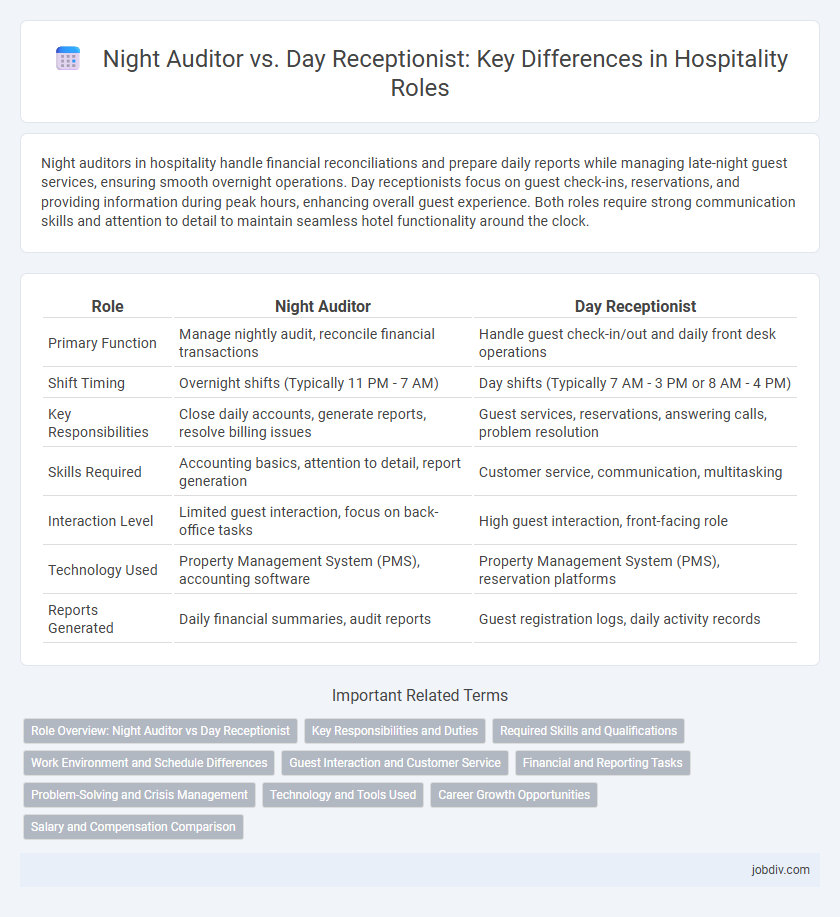Night auditors in hospitality handle financial reconciliations and prepare daily reports while managing late-night guest services, ensuring smooth overnight operations. Day receptionists focus on guest check-ins, reservations, and providing information during peak hours, enhancing overall guest experience. Both roles require strong communication skills and attention to detail to maintain seamless hotel functionality around the clock.
Table of Comparison
| Role | Night Auditor | Day Receptionist |
|---|---|---|
| Primary Function | Manage nightly audit, reconcile financial transactions | Handle guest check-in/out and daily front desk operations |
| Shift Timing | Overnight shifts (Typically 11 PM - 7 AM) | Day shifts (Typically 7 AM - 3 PM or 8 AM - 4 PM) |
| Key Responsibilities | Close daily accounts, generate reports, resolve billing issues | Guest services, reservations, answering calls, problem resolution |
| Skills Required | Accounting basics, attention to detail, report generation | Customer service, communication, multitasking |
| Interaction Level | Limited guest interaction, focus on back-office tasks | High guest interaction, front-facing role |
| Technology Used | Property Management System (PMS), accounting software | Property Management System (PMS), reservation platforms |
| Reports Generated | Daily financial summaries, audit reports | Guest registration logs, daily activity records |
Role Overview: Night Auditor vs Day Receptionist
The Night Auditor manages overnight front desk operations, balancing guest service with financial auditing of daily transactions to ensure accurate end-of-day reporting. The Day Receptionist greets guests, handles check-ins and check-outs, and addresses front desk inquiries while coordinating with other hotel departments during peak daytime hours. Both roles require strong customer service skills, but the Night Auditor combines administrative accounting duties with guest relations during quieter nighttime periods.
Key Responsibilities and Duties
Night auditors primarily handle financial reconciliation, audit reports, and overnight guest services, ensuring accurate daily accounting and smooth front desk operations during late hours. Day receptionists focus on guest check-ins and check-outs, reservations, customer assistance, and managing daily inquiries, maintaining efficient daytime front desk interactions. Both roles require strong communication, attention to detail, and proficiency with property management systems to enhance overall guest experience.
Required Skills and Qualifications
Night Auditors must have strong analytical skills, proficiency in accounting software, and the ability to handle financial reports accurately during overnight shifts. Day Receptionists require excellent communication skills, multitasking abilities, and familiarity with booking systems to manage guest interactions efficiently during busy daytime hours. Both roles demand customer service expertise, attention to detail, and experience in hospitality management or front desk operations.
Work Environment and Schedule Differences
Night auditors typically work overnight shifts in a quiet, low-traffic hotel environment focused on financial reconciliation and guest services, while day receptionists operate in a bustling lobby setting handling check-ins, check-outs, and guest inquiries during daytime hours. Night auditors often work independently with minimal supervision, whereas day receptionists collaborate closely with management and other staff members. The contrasting schedules impact employee lifestyle and workflow, with night auditors adapting to nocturnal work patterns and day receptionists engaging in peak daytime hotel activity.
Guest Interaction and Customer Service
Night auditors manage guest check-ins and resolve billing inquiries during overnight shifts, ensuring accurate financial records while providing essential customer service in quieter hours. Day receptionists handle a higher volume of guest interactions, including reservations, check-ins, and immediate service requests, prioritizing friendly, efficient communication to enhance guest experience. Both roles require strong interpersonal skills, but night auditors balance operational tasks with personalized guest support, whereas day receptionists focus more on dynamic guest engagement and problem-solving.
Financial and Reporting Tasks
Night Auditors primarily handle financial reconciliation by balancing daily transactions, auditing accounts, and preparing end-of-day financial reports to ensure accurate hotel revenue management. Day Receptionists focus on guest services, reservations, and check-in/check-out procedures, while also performing basic cash handling and updating daily financial records. The Night Auditor's role is critical for in-depth financial reporting and verifying discrepancies, supporting management with precise data for decision-making.
Problem-Solving and Crisis Management
Night auditors excel in problem-solving and crisis management by handling overnight guest issues, discrepancies in financial reports, and urgent maintenance requests with calm efficiency. Day receptionists focus on immediate front-desk concerns such as guest check-ins, inquiries, and coordinating with other departments to resolve day-time operational challenges. Both roles require strong communication skills, but night auditors often face unique situations requiring independent decision-making during quieter, less supervised hours.
Technology and Tools Used
Night auditors utilize advanced property management systems (PMS) with integrated accounting software to reconcile daily transactions and generate financial reports, often working with automated point-of-sale (POS) systems to streamline overnight operations. Day receptionists rely on cloud-based front desk solutions and guest service apps that prioritize real-time reservation updates, guest communication, and check-in/check-out processes. Both roles increasingly adopt mobile devices and contactless technology to enhance efficiency and improve the guest experience, but the night auditor focuses more on financial reporting tools while the day receptionist emphasizes guest interaction platforms.
Career Growth Opportunities
Night auditors develop specialized skills in financial reconciliation and overnight operations, creating pathways toward revenue management and accounting roles within hospitality. Day receptionists gain extensive guest interaction experience and front desk management expertise, supporting advancement into guest services supervision and hotel management positions. Both roles offer distinct career growth opportunities, with night auditors leaning toward analytical functions and day receptionists toward leadership in customer experience.
Salary and Compensation Comparison
Night auditors in the hospitality industry typically earn an average salary ranging from $30,000 to $40,000 annually, often including additional night shift differentials and overtime pay. Day receptionists usually have a slightly lower salary range of $25,000 to $35,000 per year, with fewer opportunities for shift premium pay but more consistent daytime hours. Compensation packages for night auditors may also include benefits such as paid overnight shifts and bonuses for accuracy in financial reporting, contrasting with the more customer service-focused incentives for day receptionists.
Night Auditor vs Day Receptionist Infographic

 jobdiv.com
jobdiv.com